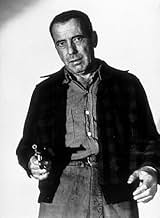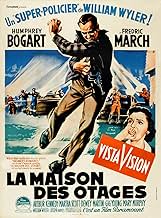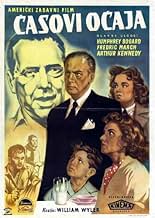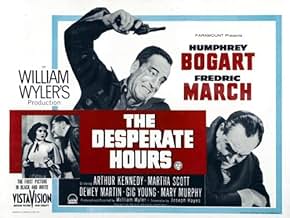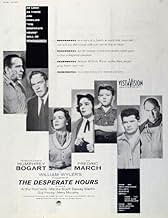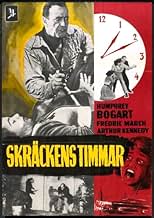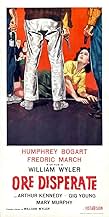PUNTUACIÓN EN IMDb
7,4/10
11 mil
TU PUNTUACIÓN
Tres convictos a la fuga se adentran en una casa en la que aterrorizan a sus habitantes.Tres convictos a la fuga se adentran en una casa en la que aterrorizan a sus habitantes.Tres convictos a la fuga se adentran en una casa en la que aterrorizan a sus habitantes.
- Dirección
- Guión
- Reparto principal
- Premios
- 2 premios y 1 nominación en total
Walter Baldwin
- George Patterson
- (sin acreditar)
John Benson
- Bellboy
- (sin acreditar)
Paul E. Burns
- Chef at Al's Dining Room
- (sin acreditar)
Edmund Cobb
- Mr. Walling
- (sin acreditar)
Reseñas destacadas
Few actors can play a gangster like Humphrey Bogart and few actors can play a decent family man like Fredric March. Both combine to give excellent performances in this thriller that explores three desperate men invading an upper middle class home after escaping from prison. William Wyler sees to it that his audience feels confined as most all the scenes are within the home. It builds to a dramatic conclusion that might not be what you expect but non-the-less believable. You feel empathy for Bogarts character and for that of his brother but ,even so, you will be rooting for the family to survive. An excellent cast adds a lot to this film. There are a few overly dramatic moments, however, they are brief.Desperate Hours will entertain you and keep you guessing. Try and see it!
Frederic March, Martha Scott, Humphrey Bogart and Arthur Kennedy are just a few of the people who endure "The Desperate Hours," a 1955 film, based on the stage play and directed by William Wyler. On Broadway, the play was directed by Robert Montgomery and starred Karl Malden in the Bogart role and Paul Newman played his brother, here played by Dewey Martin. The film also stars Gig Young, Mary Murphy, Richard Eyer, and Robert Middleton.
Having just seen Bogart in the 1936 "The Petrified Forest," it was interesting to see him still taking hostages 19 years later - and in fact, looking like he'd spent the last 19 years on the run from the law. He was clearly ill during the making of this film. Though Dewey Martin looked 30 years younger than Bogie, he was in fact only 20, making the fact that they were brothers a tiny bit more plausible.
I also had recently seen "The Star Witness," a 1931 Warner Brothers film with a similar plot, which won an Oscar for best original screenplay. By 1955, it wasn't original any longer, but the execution of the story is compelling. Martha Scott is a housewife, Ellie Hilliard, alone in her suburban home when three escaped criminals (Bogart, Martin and Middleton) take over the place. Glenn Griffin (Bogart) wants to murder the Deputy Sheriff (Arthur Kennedy) who put him in prison, and he needs to wait for the delivery of some money to make good his escape. Dan Hilliard (March) and his daughter Cynthia (Murphy) walk into the situation, followed later by the Hilliard's little boy (Eyer). You'll be wondering why the son isn't knocked off - by his parents - given the trouble he causes.
The money is delayed, and of course, the police have no idea where the gang is, as Griffin has put his car in the Hilliard garage. So the hours turn into overnight. Although March and Cynthia are allowed to leave the house for work, and Cynthia has to keep a date with her boyfriend (Young), they're too terrified to say anything for fear the mother and boy will be killed. Basically the gang as well and the family become prisoners as the hours drag on.
Wyler gives us lots of frightening and suspenseful moments as the tension builds in the house, and he never lets the pace drag. Supposedly he made March and Scott do a goodbye scene for take after take because he thought March was "acting" and wanted to tire him out. An accomplished stage actor of the old school, March consistently had a great presence but didn't always emotionally connect with his characters - he does here. March and Bogart make powerful adversaries, March hitting just the right note as an angry father afraid for his family, but not afraid to talk back to Griffin. Bogart's Griffin is shrewd and admires brains and bravery in others; the family impresses him with their guts.
Bogart is marvelous in the role - though tired out, his character is determined to keep the gang together and free; he's resentful of the middle classness of the family and how out of place he and his gang are in a nice home. Unlike his Duke Mantee in "The Petrified Forest", Bogart's Griffin doesn't seem to have a sense of the hopelessness of his situation until the very end; also unlike Duke Mantee, he has a vulnerability that he demonstrates at the end.
Robert Middleton gives a scary performance as a witless member of the gang, and Martin, as Hal, displays Hal's disillusionment with the situation, his attraction to Cynthia, and the realization that he can never have someone like her if he continues down his brother's road. Gig Young is somewhat wasted as Cythia's boyfriend - it's unnecessary star casting. Martha Scott does a terrific job as the harried wife and mother. The wonderful Arthur Kennedy gives another good performance as the sheriff determined to catch Griffin.
Highly recommended for its suspenseful story, fine direction, and top performances.
Having just seen Bogart in the 1936 "The Petrified Forest," it was interesting to see him still taking hostages 19 years later - and in fact, looking like he'd spent the last 19 years on the run from the law. He was clearly ill during the making of this film. Though Dewey Martin looked 30 years younger than Bogie, he was in fact only 20, making the fact that they were brothers a tiny bit more plausible.
I also had recently seen "The Star Witness," a 1931 Warner Brothers film with a similar plot, which won an Oscar for best original screenplay. By 1955, it wasn't original any longer, but the execution of the story is compelling. Martha Scott is a housewife, Ellie Hilliard, alone in her suburban home when three escaped criminals (Bogart, Martin and Middleton) take over the place. Glenn Griffin (Bogart) wants to murder the Deputy Sheriff (Arthur Kennedy) who put him in prison, and he needs to wait for the delivery of some money to make good his escape. Dan Hilliard (March) and his daughter Cynthia (Murphy) walk into the situation, followed later by the Hilliard's little boy (Eyer). You'll be wondering why the son isn't knocked off - by his parents - given the trouble he causes.
The money is delayed, and of course, the police have no idea where the gang is, as Griffin has put his car in the Hilliard garage. So the hours turn into overnight. Although March and Cynthia are allowed to leave the house for work, and Cynthia has to keep a date with her boyfriend (Young), they're too terrified to say anything for fear the mother and boy will be killed. Basically the gang as well and the family become prisoners as the hours drag on.
Wyler gives us lots of frightening and suspenseful moments as the tension builds in the house, and he never lets the pace drag. Supposedly he made March and Scott do a goodbye scene for take after take because he thought March was "acting" and wanted to tire him out. An accomplished stage actor of the old school, March consistently had a great presence but didn't always emotionally connect with his characters - he does here. March and Bogart make powerful adversaries, March hitting just the right note as an angry father afraid for his family, but not afraid to talk back to Griffin. Bogart's Griffin is shrewd and admires brains and bravery in others; the family impresses him with their guts.
Bogart is marvelous in the role - though tired out, his character is determined to keep the gang together and free; he's resentful of the middle classness of the family and how out of place he and his gang are in a nice home. Unlike his Duke Mantee in "The Petrified Forest", Bogart's Griffin doesn't seem to have a sense of the hopelessness of his situation until the very end; also unlike Duke Mantee, he has a vulnerability that he demonstrates at the end.
Robert Middleton gives a scary performance as a witless member of the gang, and Martin, as Hal, displays Hal's disillusionment with the situation, his attraction to Cynthia, and the realization that he can never have someone like her if he continues down his brother's road. Gig Young is somewhat wasted as Cythia's boyfriend - it's unnecessary star casting. Martha Scott does a terrific job as the harried wife and mother. The wonderful Arthur Kennedy gives another good performance as the sheriff determined to catch Griffin.
Highly recommended for its suspenseful story, fine direction, and top performances.
THE DESPERATE HOURS
Aspect ratio: 1.85:1 (VistaVision)
Sound format: Mono
(Black and white)
The patriarch of a middle-class suburban family (Fredric March) is forced to take action when they're held hostage in their own home by three escaped convicts, one of whom (Humphrey Bogart) is an experienced lifer with nothing to lose...
The first and only pairing of superstars Bogart and March is a tightly-wound thriller, written by Joseph Hayes (based on his novel and stageplay, inspired by actual events), and directed by Hollywood veteran William Wyler, distancing himself from the 'women's pictures' he had helped to popularize during the 1940's (THE LITTLE FOXES, MRS. MINIVER, THE HEIRESS etc.). Photographed in gleaming deep-focus VistaVision by Lee Garmes (SCARFACE, THE PARADINE CASE), the movie wrings incredible tension from the claustrophobic settings and frequent stand-offs between staunch family man March and embittered con Bogart. The movie's themes are fairly conservative and the outcome is never really in doubt, but this is a top-drawer thriller from Hollywood's 'golden age'. Also starring Arthur Kennedy, Martha Scott, Dewey Martin and Gig Young in crucial supporting roles. Unmissable.
NB. Though nowhere near as dreadful as most critics would have you believe, Michael Cimino's remake DESPERATE HOURS (1990) isn't a patch on the original.
Aspect ratio: 1.85:1 (VistaVision)
Sound format: Mono
(Black and white)
The patriarch of a middle-class suburban family (Fredric March) is forced to take action when they're held hostage in their own home by three escaped convicts, one of whom (Humphrey Bogart) is an experienced lifer with nothing to lose...
The first and only pairing of superstars Bogart and March is a tightly-wound thriller, written by Joseph Hayes (based on his novel and stageplay, inspired by actual events), and directed by Hollywood veteran William Wyler, distancing himself from the 'women's pictures' he had helped to popularize during the 1940's (THE LITTLE FOXES, MRS. MINIVER, THE HEIRESS etc.). Photographed in gleaming deep-focus VistaVision by Lee Garmes (SCARFACE, THE PARADINE CASE), the movie wrings incredible tension from the claustrophobic settings and frequent stand-offs between staunch family man March and embittered con Bogart. The movie's themes are fairly conservative and the outcome is never really in doubt, but this is a top-drawer thriller from Hollywood's 'golden age'. Also starring Arthur Kennedy, Martha Scott, Dewey Martin and Gig Young in crucial supporting roles. Unmissable.
NB. Though nowhere near as dreadful as most critics would have you believe, Michael Cimino's remake DESPERATE HOURS (1990) isn't a patch on the original.
Bogie had done films like this one before: The Petrified Forest (1936), High Sierra (1941), Key Largo (1948) and We're No Angels (1955) all with Bogie as a gangster or victim of a gangster, in a desperate setting (although the last one is a comedic spoof). Desperate Hours, however, is different this time out, Bogie (as Glen Griffin) has a whole suburban family as hostage as he tries to complete his run for freedom from the law. Is this the first such home invasion type movie? Perhaps Suddenly (1954)?
The story is simply superb. Every good narrative succeeds because of certain literary aspects: a believable story line, down-to-earth dialog that supports it, a good measure of irony at appropriate turning points, just the right amount of coincidence that can intrude on anybody's daily experience, a dogged police officer who just won't give up in the search for what he believes, and a family an ordinary family that finds within itself the courage, imagination, and strength to persevere in the face of the real threat of death.
I saw this film long ago when just a lad, so I didn't recall much of the story at all. But, being a Bogie fan, I looked forward to seeing it again when I got a hold of a DVD recently. I don't recall what movies were in the running for the Oscars that year, but I think this should have been a contender (apparently, it wasn't).
The cast was well chosen. Bogie, of course, was "made" for this part, having done so many like it in the past and that's not a side-swipe at typecasting; Robert Middleton almost steals the movie with his portrayal of the psychopathic Kobish -- a chilling portrayal; Dewey Martin as Bogie's brother, Hal, provides a sense of decency that the other two lack, the only jarring note for me: why should he? He's on the run, and drops all pretense of humanity when he decides to cut and run by himself. And, we know what happens to anybody who cuts and runs, right? Frederic March as Dan Hilliard ably shows what can happen to your principles and behavior when lives are at stake: most of life's niceties go out the window as he tries to save his family. Understandable, given the desperate situation. Martha Scott as his wife and Mary Murphy as his daughter (Cindy) are suitably frightened most of the time, but they also summon the courage to oppose the bad guys when possible. The guy who isn't used so much is Arthur Kennedy as deputy sheriff Bard, but his role is pivotal in bringing the story to a satisfactory ending. Pity, because Kennedy was as fine an actor as Bogie or March. Gig Young, as Cindy's suitor, rounds out the main cast he playing the puzzled hopeful who just won't go away when Cindy pleads with him to "stay away". It's just as well that he didn't...
The setting in small town America is just right, the picture perfect home of the Hilliards standing for the American dream that is about to threatened and even destroyed. Which gives rise to one of the best lines in cinema history, spoken by March near the end: "Get out get out of my house!" he nearly screams at Bogie, thus cementing forever in film the idea of a man's home as his castle. Bogie visibly wilts before the stern and righteous wrath of March but not only because of that does Bogie give it all up. You'll have to see the film to understand why.
Most of the action is within the confines of the Hilliard house (having been a stage play first, that makes sense) and the cinematography takes full advantage of all those nooks and crannies to enthrall the viewer and keep the suspense running. I liked particularly the reasonably long take of the camera behind the bad guys while they watch the old trash collector do his work and who seems to miss the presence of their stolen car in the garage. It's a priceless piece of work as the escapees faces keep looking at each other and then at the old man and the viewer stays on edge, all the time, wondering: will he react?
The final showdown is simply a tour de force. It's fast and furious, ranging all through the ground floor, up the stairs and into the bedrooms, and then back again, as the protagonists fight it out for supremacy; I was reminded of Dustin Hoffman's running fight with the bad guys in Straw Dogs (1971). In the hands of an inept director, it would have been farcical but Wyler turns on the suspense and the irony as March overcomes his adversary Bogie in one of the coolest ways imaginable. No, I won't tell you, because that would spoil it for you.
As the credits rolled by at the end, my immediate thought was that this type of story is so believable, it could happen to me, or you...
The story is simply superb. Every good narrative succeeds because of certain literary aspects: a believable story line, down-to-earth dialog that supports it, a good measure of irony at appropriate turning points, just the right amount of coincidence that can intrude on anybody's daily experience, a dogged police officer who just won't give up in the search for what he believes, and a family an ordinary family that finds within itself the courage, imagination, and strength to persevere in the face of the real threat of death.
I saw this film long ago when just a lad, so I didn't recall much of the story at all. But, being a Bogie fan, I looked forward to seeing it again when I got a hold of a DVD recently. I don't recall what movies were in the running for the Oscars that year, but I think this should have been a contender (apparently, it wasn't).
The cast was well chosen. Bogie, of course, was "made" for this part, having done so many like it in the past and that's not a side-swipe at typecasting; Robert Middleton almost steals the movie with his portrayal of the psychopathic Kobish -- a chilling portrayal; Dewey Martin as Bogie's brother, Hal, provides a sense of decency that the other two lack, the only jarring note for me: why should he? He's on the run, and drops all pretense of humanity when he decides to cut and run by himself. And, we know what happens to anybody who cuts and runs, right? Frederic March as Dan Hilliard ably shows what can happen to your principles and behavior when lives are at stake: most of life's niceties go out the window as he tries to save his family. Understandable, given the desperate situation. Martha Scott as his wife and Mary Murphy as his daughter (Cindy) are suitably frightened most of the time, but they also summon the courage to oppose the bad guys when possible. The guy who isn't used so much is Arthur Kennedy as deputy sheriff Bard, but his role is pivotal in bringing the story to a satisfactory ending. Pity, because Kennedy was as fine an actor as Bogie or March. Gig Young, as Cindy's suitor, rounds out the main cast he playing the puzzled hopeful who just won't go away when Cindy pleads with him to "stay away". It's just as well that he didn't...
The setting in small town America is just right, the picture perfect home of the Hilliards standing for the American dream that is about to threatened and even destroyed. Which gives rise to one of the best lines in cinema history, spoken by March near the end: "Get out get out of my house!" he nearly screams at Bogie, thus cementing forever in film the idea of a man's home as his castle. Bogie visibly wilts before the stern and righteous wrath of March but not only because of that does Bogie give it all up. You'll have to see the film to understand why.
Most of the action is within the confines of the Hilliard house (having been a stage play first, that makes sense) and the cinematography takes full advantage of all those nooks and crannies to enthrall the viewer and keep the suspense running. I liked particularly the reasonably long take of the camera behind the bad guys while they watch the old trash collector do his work and who seems to miss the presence of their stolen car in the garage. It's a priceless piece of work as the escapees faces keep looking at each other and then at the old man and the viewer stays on edge, all the time, wondering: will he react?
The final showdown is simply a tour de force. It's fast and furious, ranging all through the ground floor, up the stairs and into the bedrooms, and then back again, as the protagonists fight it out for supremacy; I was reminded of Dustin Hoffman's running fight with the bad guys in Straw Dogs (1971). In the hands of an inept director, it would have been farcical but Wyler turns on the suspense and the irony as March overcomes his adversary Bogie in one of the coolest ways imaginable. No, I won't tell you, because that would spoil it for you.
As the credits rolled by at the end, my immediate thought was that this type of story is so believable, it could happen to me, or you...
Dan Hilliard and his family are perfect Americans, corresponding admirably to the bourgeois ideal. The two children are bright, good-looking and obedient. Cindy is about 20 and is going steady with an attorney who owns a sports car. Ralphy is eight or so, all plaid shirts, jeans and attitude. He has a baseball mitt and a bicycle. Ellie, Dan's wife, runs their spotless home with quiet efficiency. Everything is in its place. Trash collectors call at fixed times. Breakfast is a serene family ritual. The Hilliards' home life is as balanced, as regular and as dull as the barometer on the wall. As for Dan Hillier himself, he has attained that mythic status to which all 1950's bourgeois males aspired - he is an executive. The middle classes don't want adventure in their lives, they want predictability. And this is the perfect, dream-like state in which the Hilliards pass their anodyne existence, secure in their suburban womb - until the American Nightmare is unleashed upon them.
What if members of The Underclass, with their dirty, unshaven physicality and their sagging, torn clothes should irrupt into the suburbs? What if, by some catastrophic failure, the police and the prison service can't keep The Underclass in its designated containers? How will nice folks like the Hilliards cope if confronted by these alien beings?
There has been a jailbreak. The citizens of Indianapolis have been warned to watch out for three desperadoes - the two Griffin brothers and their accomplice Kobish. Little do the Hilliards realise as they go about their tranquil suburban lives, but the fugitives are about to choose the Hilliard home as a place to hole up ...
Like "Suddenly", made a year earlier, this is a 'bad guys invaded my home' movie. The downside of bourgeois affluence is the fear that the disenfranchised masses will come to take away your goodies.
Humphrey Bogart was in his late 50's and clearly ailing when he played the part of Glenn Griffin, the leader of the fugitive trio. He would make only two more films in the short time that was left to him. Dewey Martin, 26 years his junior, plays his kid brother Hal.
More than anything, "The Desperate Hours" is a film about social class. "You can't play ball with savages like that," opines a Madison County detective. Glenn holds his social superiors in equal contempt, calling them "smart-eyed respectable suckers". He warns Hal not to expect any favours from the class enemy: "Guys like Hilliard ever give you a fair shake?" Much play is made of linguistic markers which separate the educated from the rest ('whom' instead of 'who'), and contrasts in table manners between the refined Hilliards and their thuggish captors. Glenn lashes out against the tea tray, that emblem of middle-class gentility, and the virginal Cindy, whom he urges Hal to 'take'.
Dire though the Hilliards' predicament may be, they are not alone. They are exactly the kind of people the forces of law and order exist to protect and serve, and it is not long before Madison County's finest and the FBI are closing in on the fugitives. And the cops have science on their side. They can tap the phone of Glenn's girlfriend in Pittsburgh, and tail her across America as she heads for the rendezvous. In the police station, the humming wires never rest as technology narrows down the bad guys' options.
Middle-class sensibility is all-pervasive. Chuck and Cindy argue near the sports car, but break off abruptly when two people pass by. No matter how deeply the emotions may run, it isn't seemly to fight in front of the neighbours. Dan's secretary can tell, from nuances of his behaviour, that something is very wrong. Similarly, the trashman senses that things are amiss with Ellie by the quality of her chat. We see Cindy admiring her curves in front of the hallway mirror, because it is important that she be sexually desirable (so that the fugitives will regard her as a chattle). Chuck, however, has to remain sexually thwarted, because his behaviour is bound by rigid bourgeois restrictions. We see him raise the arm-rest in his sports car in the hope of a grappling session with Cindy, then lowering it dejectedly when he realises that his luck is out. Dan's wave to Chuck to cross the threshold is a symbolic acceptance of him as a son-in-law. He has made it into The Family.
Light represents goodness. Cindy comes home after another chaste date with Chuck and is bathed in bright light on the doorstep. Dan and Ellie declare their love for each other, their bodies lit intensely in an otherwise black bedroom. The searchlights of the police, and the bad guys' vain attempts to eradicate them, show us figuratively what we yearn to see - that good will always triumph over social disruption.
The overpowering of Ellie, the smashing of Ralphy's toy plane and the collapse of Cindy all happen on the same spot and are all filmed from the same low angle. These dramatic incidents show the Hilliards at bay, and the unusual vantage-point stresses the 'wrongness' of what is happening.
Implausibilities abound throughout the movie. How likely is it that the front door would be left unlocked, that Chuck would reach the house ahead of the cops, or that Dan would insist on carrying a gun, then empty its clip? Why would he hesitate to call the police in, once he got the upper hand? Why would everyone leave the family unattended, moments after the conclusion of a violent and dramatic siege?
And yet it works. Glenn's love of his brother breaks through his tough-guy facade, and after he gives his guns away he undergoes a tragic 'King Lear' moment of self-realisation. These are powerful moments in a powerful film.
What if members of The Underclass, with their dirty, unshaven physicality and their sagging, torn clothes should irrupt into the suburbs? What if, by some catastrophic failure, the police and the prison service can't keep The Underclass in its designated containers? How will nice folks like the Hilliards cope if confronted by these alien beings?
There has been a jailbreak. The citizens of Indianapolis have been warned to watch out for three desperadoes - the two Griffin brothers and their accomplice Kobish. Little do the Hilliards realise as they go about their tranquil suburban lives, but the fugitives are about to choose the Hilliard home as a place to hole up ...
Like "Suddenly", made a year earlier, this is a 'bad guys invaded my home' movie. The downside of bourgeois affluence is the fear that the disenfranchised masses will come to take away your goodies.
Humphrey Bogart was in his late 50's and clearly ailing when he played the part of Glenn Griffin, the leader of the fugitive trio. He would make only two more films in the short time that was left to him. Dewey Martin, 26 years his junior, plays his kid brother Hal.
More than anything, "The Desperate Hours" is a film about social class. "You can't play ball with savages like that," opines a Madison County detective. Glenn holds his social superiors in equal contempt, calling them "smart-eyed respectable suckers". He warns Hal not to expect any favours from the class enemy: "Guys like Hilliard ever give you a fair shake?" Much play is made of linguistic markers which separate the educated from the rest ('whom' instead of 'who'), and contrasts in table manners between the refined Hilliards and their thuggish captors. Glenn lashes out against the tea tray, that emblem of middle-class gentility, and the virginal Cindy, whom he urges Hal to 'take'.
Dire though the Hilliards' predicament may be, they are not alone. They are exactly the kind of people the forces of law and order exist to protect and serve, and it is not long before Madison County's finest and the FBI are closing in on the fugitives. And the cops have science on their side. They can tap the phone of Glenn's girlfriend in Pittsburgh, and tail her across America as she heads for the rendezvous. In the police station, the humming wires never rest as technology narrows down the bad guys' options.
Middle-class sensibility is all-pervasive. Chuck and Cindy argue near the sports car, but break off abruptly when two people pass by. No matter how deeply the emotions may run, it isn't seemly to fight in front of the neighbours. Dan's secretary can tell, from nuances of his behaviour, that something is very wrong. Similarly, the trashman senses that things are amiss with Ellie by the quality of her chat. We see Cindy admiring her curves in front of the hallway mirror, because it is important that she be sexually desirable (so that the fugitives will regard her as a chattle). Chuck, however, has to remain sexually thwarted, because his behaviour is bound by rigid bourgeois restrictions. We see him raise the arm-rest in his sports car in the hope of a grappling session with Cindy, then lowering it dejectedly when he realises that his luck is out. Dan's wave to Chuck to cross the threshold is a symbolic acceptance of him as a son-in-law. He has made it into The Family.
Light represents goodness. Cindy comes home after another chaste date with Chuck and is bathed in bright light on the doorstep. Dan and Ellie declare their love for each other, their bodies lit intensely in an otherwise black bedroom. The searchlights of the police, and the bad guys' vain attempts to eradicate them, show us figuratively what we yearn to see - that good will always triumph over social disruption.
The overpowering of Ellie, the smashing of Ralphy's toy plane and the collapse of Cindy all happen on the same spot and are all filmed from the same low angle. These dramatic incidents show the Hilliards at bay, and the unusual vantage-point stresses the 'wrongness' of what is happening.
Implausibilities abound throughout the movie. How likely is it that the front door would be left unlocked, that Chuck would reach the house ahead of the cops, or that Dan would insist on carrying a gun, then empty its clip? Why would he hesitate to call the police in, once he got the upper hand? Why would everyone leave the family unattended, moments after the conclusion of a violent and dramatic siege?
And yet it works. Glenn's love of his brother breaks through his tough-guy facade, and after he gives his guns away he undergoes a tragic 'King Lear' moment of self-realisation. These are powerful moments in a powerful film.
¿Sabías que...?
- CuriosidadesThe character of Glenn Griffin was made older so Humphrey Bogart could play the role. The stage version starred Karl Malden and a young Paul Newman in the Bogart role.
- PifiasBefore Glenn asks Eleanor if she could make a phone call without crying, he puts his left hand in his pocket. When she stands up and walks to the phone, he puts the same hand in the pocket again.
- Citas
[first lines]
[the morning newspaper hits the front door]
Ellie Hilliard: I'll get it, darling.
Daniel Hilliard: [about the newspaper boy's routine of always hitting the front door with the newspaper] Some morning I'm gonna catch up with that kid.
Selecciones populares
Inicia sesión para calificar y añadir a tu lista para recibir recomendaciones personalizadas
- How long is The Desperate Hours?Con tecnología de Alexa
Detalles
- Fecha de lanzamiento
- País de origen
- Idioma
- Títulos en diferentes países
- The Desperate Hours
- Localizaciones del rodaje
- Empresa productora
- Ver más compañías en los créditos en IMDbPro
Taquilla
- Presupuesto
- 2.388.000 US$ (estimación)
- Duración1 hora 52 minutos
- Color
- Relación de aspecto
- 1.37 : 1(original ratio)
Contribuir a esta página
Sugerir un cambio o añadir el contenido que falta

Principal laguna de datos
By what name was Horas desesperadas (1955) officially released in India in English?
Responde

